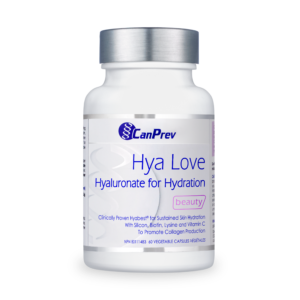Hyaluronic acid, and its salt form sodium hyaluronate, have recently become popular in the world of beauty and skincare. And for a good reason. It may be known for its anti-aging capabilities, but its benefits actually go beyond this.
What is hyaluronic acid?
Hyaluronic acid is a clear, gooey substance that’s naturally found in our skin, connective tissue, and eyes. Its main job is to retain water in your tissues and provide lubrication. It also acts as a shock absorber within joints and is responsible for reducing joint inflammation as well as promoting the growth of new cells and tissues for cartilage and bones.
You may see some products with sodium hyaluronate, a form of hyaluronic acid.
Hyaluronic acid vs. Sodium hyaluronate
Sodium hyaluronate is a sodium salt that’s derived from hyaluronic acid. Although both acid and salt forms help moisturize your skin and make you look youthful, they differ in their methods.
Since hyaluronic acid has a higher molecular weight, its large molecules coat the skin and promote hydration by preventing the loss of water. On the other hand, sodium hyaluronate has a lower molecular weight. This means its small molecules push past the epidermis (top layer of the skin), encouraging hydration within the lower layers of the skin.
The importance of skin health beyond anti-aging

Our skin is the largest organ in the human body. It’s also the first point of contact for germs, harmful bacteria, viruses, and other unfriendly microorganisms to enter the body. What protects you from these harmful substances is your skin microbiome. This is the collection of bacteria found on the surface of your skin that defends the skin and the rest of the body from unwanted pathogens.
Your skin barrier and the immune system
Protecting your skin means caring for your body’s first line of defence. Properly hydrated skin can help prevent cracks, cuts or breaks in the skin. And using hyaluronic acid may increase your chances of having a stronger immune response. This is because hyaluronic acid has been shown to have wound-healing capabilities. It can speed up recovery when applied to an open wound by regulating inflammation levels and promoting the production of more blood vessels. By doing this, it moisturizes your skin and reduces the possibility of infectious substances entering your body.
One study tested the effects of using only hyaluronic acid as a treatment for subjects with seborrheic dermatitis (a type of eczema) of the face. They found that using hyaluronic acid had a strong skin hydrating effect, which improved the symptoms of seborrheic dermatitis. They also noted that this indirectly influenced the skin microbiome by restoring the equilibrium of the bacteria. A balanced skin microbiome is vital for your skin to look and feel healthy. It’s also important for the skin to be able to properly defend against invaders for your overall immune health.
Apart from being a great moisturizer and helping your immune system, hyaluronic acid also has many other benefits. It reduces acne scars, increases skin elasticity, helps with treating eczema and calms redness on the skin.
How do you use hyaluronic acid?
There are three main forms of hyaluronic acid:
- Oral – Studies have shown that taking 120 to 240 milligrams of oral hyaluronic acid supplements per day increased moisture in the skin and reduced dry skin. Supplements can be found in most natural health food stores or drugstores. Hya-Love by CanPrev features Hyabest®, a source of sodium hyaluronate clinically proven to improve skin hydration. This formula can also help protect against free radical damage, promote smooth and glowing skin, and is perfect for encouraging collagen formation for skin, hair, and nails. Learn more about CanPrev’s Hya-Love formula here.
- Topical – Topical forms of hyaluronic acid include serums, creams, facial cleansers, and makeup with an added hyaluronic acid component. You can find these in cosmetic stores, beauty stores, or salons.
- Injection – Injectable hyaluronic acid fillers are commonly used to help relieve joint pain and improve age-related elasticity of facial skin. This type of treatment is only provided by healthcare practitioners.
Talk to your healthcare practitioner to see if one of these forms of hyaluronic acid or sodium hyaluronate may be beneficial for you. And, the next time you do your skincare routine, remember that you’re caring for more than just your appearance. You’re looking out for your skin immunity too.
Sources:
What Is Sodium Hyaluronate and How Is It Used in Skin Care?
Why Science Says Hyaluronic Acid Is the Holy Grail to Wrinkle-Free, Youthful Hydration
All the Things Hyaluronic Acid Can Do for Your Skin, Bones, and Beyond
Ingested hyaluronan moisturizes dry skin
Rejuvenating influence of a stabilized hyaluronic acid-based gel of nonanimal origin on facial skin aging
Why your skin microbiome is so important to your health
Effects of a cream containing 5% hyaluronic acid mixed with a bacterial-wall-derived glycoprotein, glycyrretinic acid, piroctone olamine and climbazole on signs, symptoms and skin bacterial microbiota in subjects with seborrheic dermatitis of the face
What Is Hyaluronic Acid?



8 Comments on “Hyaluronic acid and sodium hyaluronate for your skin and beyond”
Can I find this in lndn on? Safe for cancer patients—breast cancer?
Hi there, thank you for your interest in our products! You can find a retail location near you by visiting this page. As with any natural health product, we recommend that you consult a healthcare practitioner prior to use. Hope this helps!
Where can I buy it in St.Thomas Ontario Canada 🇨🇦
Hi there, thank you for your interest in our products! You can find a retail location near you by visiting this page. Hope this helps!
how can get to product
Hi there, thank you for your interest in our products! You can find a retail location near you by visiting this page. Hope this helps!
I believe in Can Prev products. My daughter—a Registered Nutritionist/Microscopist, introduced me to this company and their products, best suited for me at my age, issues and stage in life. There have not been any negatives to me/health during my continued use.
Thank you Peggy for your message! We’re glad to be a part of your healthcare journey.